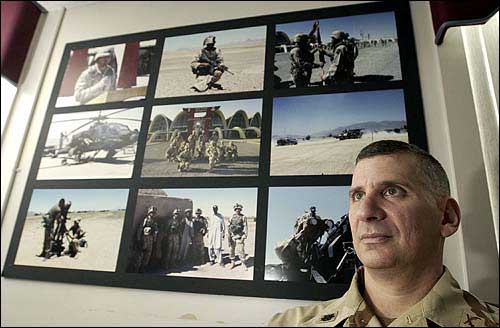Lt. colonel is highest-ranking officer killed in hostile fire
FORT CAMPBELL, Ky. ? A military police commander killed this week during a bloody battle outside a cleric’s headquarters has become the highest-ranking Army officer killed in hostile fire in Iraq, according to an Army spokesman at the Pentagon.
Lt. Col. Kim S. Orlando was among three soldiers from the 101st Airborne Division, based at Fort Campbell, killed when a joint U.S.-Iraqi patrol confronted gunmen outside a mosque in the Shiite Muslim holy city of Karbala.
Staff Sgt. Joseph P. Bellavia, 28, of Wakefield, Mass.; and Cpl. Sean R. Grilley, 24, of San Bernardino, Calif., also were killed, as well as 10 Iraqis.
“He had a great personality. A great sense of humor. He had a kind of capability and leadership to fit whatever occasion necessary,” said George Heath, a Fort Campbell spokesman.
Orlando, 43, was commander of the 716th Military Police Battalion, which had been sent to Iraq to help the Marines before the Iraq war started on March 20.
“His job as a battalion commander was a job that only people with great potential and with the ability to handle great responsibility are given,” Heath said.
Orlando was a company commander with the 101st Airborne during the Gulf War, earning the Bronze Star for his service.
In an interview with The Associated Press in March, he spoke of his expected return to the Persian Gulf region. “It’s OK to have a little bit of fear, because I think it’s healthy,” Orlando said at the time.
Eric Provost, a retired military police officer who served at Fort Campbell and was a friend of Orlando’s, said Saturday that the fallen soldier “understood the fears” of going to war, but also knew his role as a commander.

Lt. Col. Kim S. Orlando, commander of the 716th Military Police Battalion, poses in front of photographs from recent deployments of the 101st Airborne Division (Air Assault) at Fort Campbell, Ky., in this Feb. 25 file photo. Orlando, of Tennessee, was killed Friday in Iraq.
Provost said while it was not unusual to have a senior officer in combat, Orlando’s death showed the risks in Iraq.
The death of a battalion commander “should be a real flag for everybody,” he said. “Inherently, you have to know that the risk of death had to be there for every member of his battalion for him to be there,” Provost said.
Two other Army lieutenant colonels have been killed in noncombat incidents in Iraq.
Orlando joined the Army in 1982. He served as executive officer of the military police command for the Army’s 18th Airborne Corps at Fort Bragg, N.C., before moving to Fort Campbell.
| As of Saturday, 336 U.S. service members have died since the beginning of military operations in Iraq, according to the Department of Defense.The British reported 50 deaths; Denmark, one; and Ukraine, one.Since May 1, when President Bush declared that major combat operations in Iraq had ended, 198 U.S. soldiers have died in Iraq.Since the start of military operations, 1,562 U.S. service members have been injured as a result of hostile action. Nonhostile injured numbered 335. |
Orlando is survived by his wife, Sherry, who works in the public affairs office at Fort Campbell, and two young sons.







